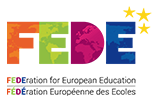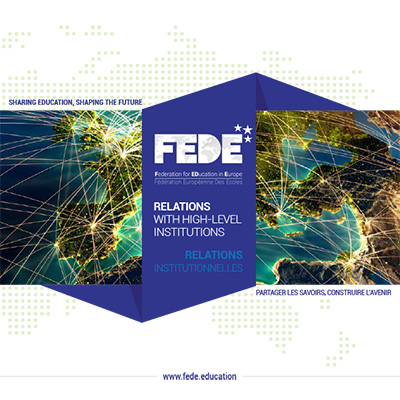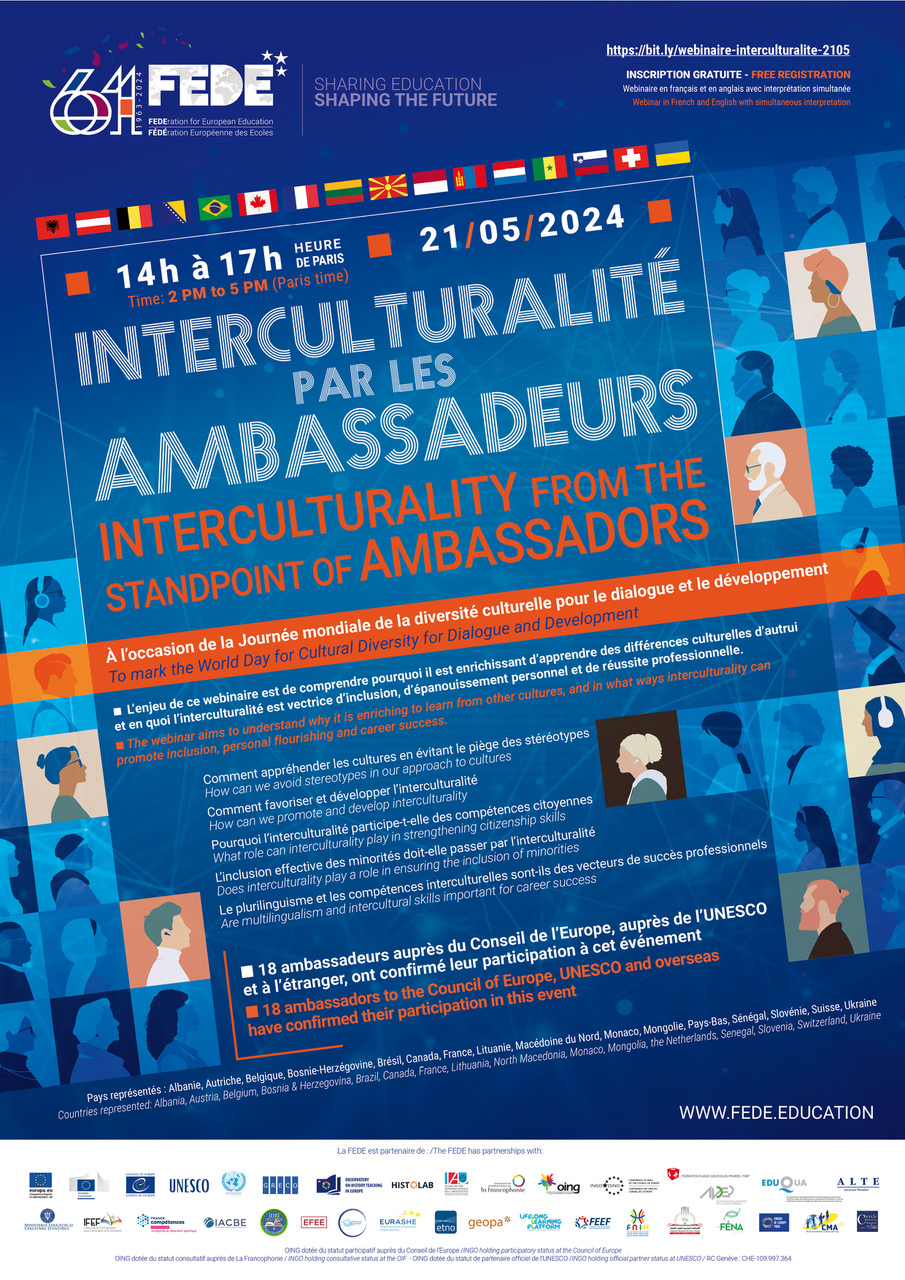Interview with Xavier Paroutaud, Director of Education at the FEDE
Invited by the OHTE to speak on 12 May 2022 as a panellist on the topic ‘The end of peace in Europe?’, Xavier Paroutaud answered questions posed by former minister and MEP Alain Lamassoure concerning the challenges facing democracy and the role of the Council of Europe and the Observatory in promoting balanced and dispassionate history teaching.
1. How can we define Europe and describe its history?
That depends on which Europe we are talking about, on our perspective and our field; but it is essential to use history to describe Europe. In this sense, we would probably have to start with a geographical description, then think about constructing a history of the continent (to the extent that there is such a history or that it is possible to do so), describing the main events that have had a continent-wide impact. Here we would also have to provide a history of relations between different entities that have shaped what Europe is (these could be political alliances, armed conflicts, trade agreements, cultural exchanges, scientific cooperation, and so on). We would also need to construct a contemporary history of Europe’s institutions.
But we could also describe Europe by focusing more on its people, emphasising their diversity and providing a comparative history of Europe’s various peoples, cultures, social groups, rules and customs, religions and beliefs.
We could also envisage a history of European cultural identity, starting with Europe’s Greek, Roman and Judeo-Christian beginnings, then moving on to major modern schools of thought (Renaissance, humanism, the Enlightenment); the aim would be to look for shared values that have been broken apart, mishandled, forgotten and then revived.
The history of Europe is a very complex subject and should be handled with prudence and humility. We need to ensure we are ready to examine and re-examine our findings, be patient with any dead ends and accept that we cannot understand everything since there are countless aspects to consider. It is probably for this reason that the history of Europe kindles so much curiosity, debate, agreement and disagreement, all of which makes it an important driver for political life (in the sense of civic life). For this reason, we need a method, reference points, and frameworks that, to the extent that it is possible, are shared by everyone – even if these tools need constantly to be updated so as to integrate different perspectives.
2. What led to the creation of institutions in Europe?
I think the main reason was the war, followed by a desire for peace and for the means to implement and protect that peace. Subsequently we saw the rise of cooperative frameworks, strong institutions, and social and political contracts at the European level. Behind all of these we see, above all, a desire for places, spaces and frameworks to facilitate meetings, dialogue and cooperation that would create shared interests and economic partnerships.
In all humility, the history of the FEDE is an example of European construction. The FEDE was founded 1963 on the initiative of primary and secondary private educational institutions in Spain, Italy, Austria, Germany and Switzerland. This was the time of the Cold War, and the aim was to found the FEDE on a shared sense of European culture and better mutual understanding between countries in Western Europe via language learning. This project was implemented in a very pragmatic way: children of different nationalities were brought together and learnt to speak one another’s language, thereby contributing to the emergence of a shared European culture.
3. What is the purpose of teaching the history of European construction in today’s schools and universities? How is this history told?
I went to school on Reunion Island – so far from mainland France and from continental Europe. I remember that it was difficult for me to connect up what I learnt in history lessons in school with what was going on around me. I studied the Second World War, the founding of the European Coal and Steel Community (ECSC) and the founding of the European Economic Community. And yet I didn’t make the connection with the big bridge being built to link up the two parts of my town, which were separated by a river, and which had a sign on it saying it was financed by the EU. It was as if I was missing the deeper storyline, that of the building and sharing of a certain type of Europe. European construction could be given more emphasis in education and be connected with other school subjects studied by young Europeans. This would raise their awareness of the many advantages of collective European construction: the free movement of people, goods and services; the single currency; Erasmus exchanges; European social dialogue; and European funding for research and infrastructure projects.
This is actually what drew me to the FEDE. It is essential that vocational students take a module in European culture and citizenship, regardless of their professional sector, and that such a module include a history of Europe’s institutions and their workings, along with ideas on European identity or identities.
The FEDE’s decision to offer such a module and to encourage reflection on European culture and citizenship in the framework of vocational education is very interesting: it implies that students are training for a profession that they will practice in a company that is located in a specific city that is part of the world, and that, therefore, they are also training to be citizens. It is crucial to pay particular attention to the origins of European institutions, rather than simply to commercial and economic development in Europe. If we do not understand our institutions and their role, both at a national and a European level, we will tend to consider them as constraints. However, if we know why these institutions were set up, we can understand, where relevant, the spirit in which they were created, and that will allow us, without idealism, to take stock of the results. Additionally, if we know how our institutions work we can make the most of what they have to offer us.
4. Where does the Council of Europe come into a historical approach to Europe?
The Council of Europe has fewer political obligations, which has made it possible to attract 46 member countries, as opposed to the EU’s 27 member. The Council is a precious forum for dialogue and it produces high-quality reference frameworks that provide both material for reflection and practical guidelines for Member States. However, European citizens also need to understand Europe’s political institutions.
It is for this reason that the FEDE has worked with the Council of Europe’s Group of States against Corruption (GRECO) to develop a joint teaching module. The programme on corruption and anticorruption legislation was developed in 2018-2019, and in 2019 it was included as an additional chapter in section A2 of our European Culture and Citizenship unit, which is taken by all bachelor’s students. As of June 2022, some 15,000 students have already taken the course and corresponding examination. These students are enrolled in 150 FEDE higher and vocational educational institutions across 12 countries (Belgium, France, Spain, Switzerland, Luxembourg, Morocco, Algeria, Côte d’Ivoire, Senegal, Burkina Faso, Gabon and Congo). We have had very positive feedback on the course, both from teachers and students. Each year, around 5000-6000 additional students take the course, which raises their awareness of corruption in all its forms. The course is helping us to implement one of the key goals of the FEDE and its network: the promotion of the values of democracy, human rights and the rule of law, both in Europe and beyond.
5. What role can the Observatory on History Teaching in Europe play in promoting European history?
It can be difficult, or even dangerous sometimes, for individuals, social groups and political actors to talk about history or ‘do’ history. Consequently, many countries are finding it difficult to discuss the subject. The information and methods produced by the Observatory could be tools that will help us to overcome, or reduce, certain obstacles in this respect.
In a certain sense, the OHTE, through the data it produces via original, broad-ranging comparative studies, can demonstrate why history teaching is essential for building a culture of democracy. Probably we need to demonstrate that history teaching is much more than describing historical facts and that we need to question the historiographical traditions associated with the politicisation of history. We need to demonstrate that writing history is in itself a form of politics. We need to update the various historical collages we have created in a comparative manner, without value judgements; not in order to de-mythologise them but instead to reflect on what history represents for each country and on how history and the relationship to history have been fashioned in each country, particularly after 1945. We will need to observe how national traditions have developed, since here we are touching upon forms of national awareness in each country; that is, history is always written in a given country, in a given language, and it is taught in a given school, which means that it is not necessarily objective. On the other hand, the Observatory also needs to form a network of stakeholders who want to promote history teaching in Europe (associations, NGOs, Member States, and so on).
As part of our cooperation with the OHTE, in November 2021 the FEDE suggested that it co-develop with the Observatory a course focusing on history teaching. The course would be compulsory for all FEDE bachelor’s students. The aim is to develop an appropriate methodological approach to underpin the content of this course, which will be entitled ‘Why history?’. The course would not be prescriptive, but would provide learners, who are often relatively uninformed about history and historical thought, with tools for improving their understanding. We would cover, for example, the duty of memory and professional ethics in historical research; we would also help learners to develop analytical and critical thinking skills so that they will be able to form their own opinions on the basis of reliable sources while also listening to others. The course will be taken by students in a number of European and African countries. The OHTE will provide precious expertise in helping the FEDE to ensure that this module is as neutral as possible and respects the memory of different peoples.
Xavier Paroutaud
Director of Education at the FEDE


